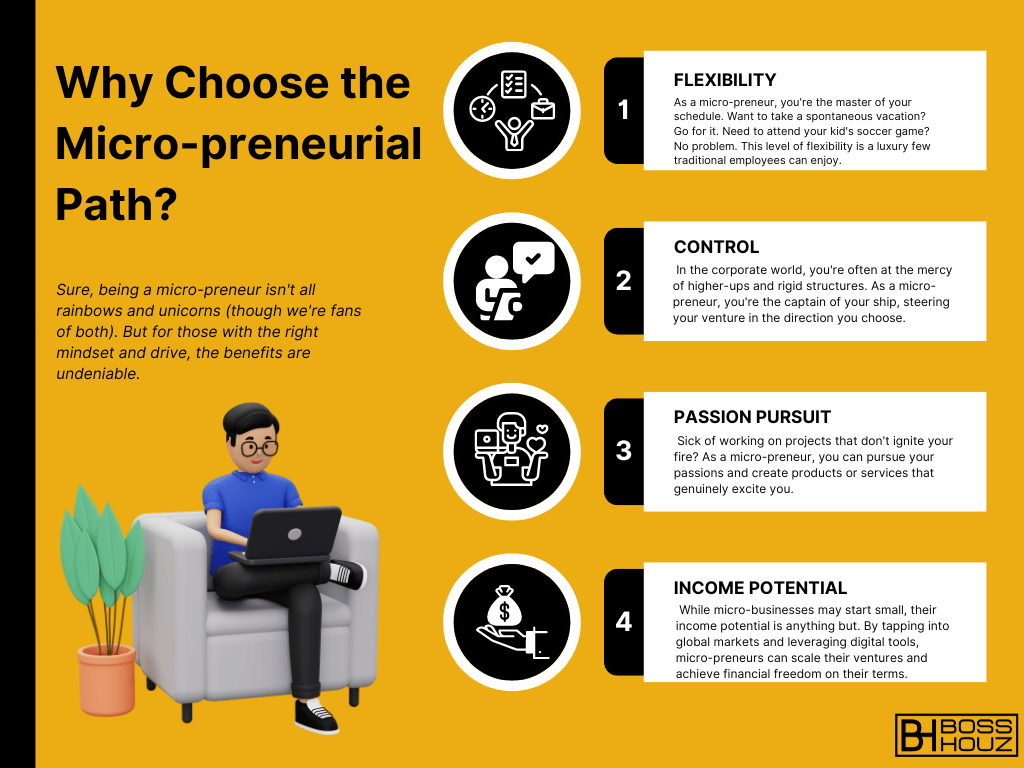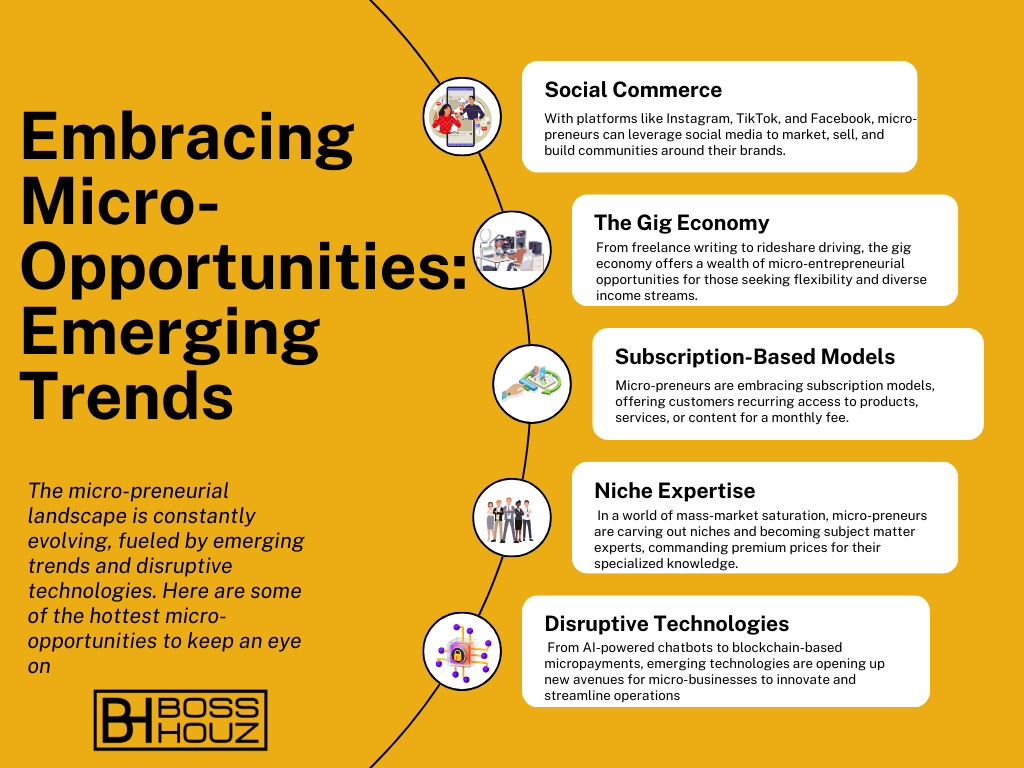Forget the cubicle, ditch the commute. Embrace the world (and your passions) as a micro-preneur! These modern-day mavericks are building sustainable, small-scale businesses fueled by technology and a whole lot of hustle. Think Etsy shops blossoming into empires, bloggers cultivating dedicated followings, and freelance wizards crafting thriving careers – all driven by the ingenuity and passion of one individual (or a small team).
Are you tired of the 9-to-5 grind? Craving more freedom, flexibility, and the ability to pursue your passions? Well, buckle up because micro-preneurship might just be the game-changer you’ve been searching for.
Key Takeaways:
- Micro-preneurship empowers individuals to create sustainable, small-scale ventures leveraging digital tools.
- It offers flexibility, control, and the potential for high rewards without the risks of traditional entrepreneurship.
- Emerging trends like the gig economy, social commerce, and disruptive technologies fuel micro-preneurial growth.
- Success lies in identifying niche markets, embracing technology, and building a loyal customer base.
Table of Contents
The Rise of the Micro-Mavericks
In the aftermath of the 2008 financial crisis, a new breed of entrepreneurs emerged – the micro-preneurs. As traditional jobs became scarce, these mavericks saw an opportunity to break free from corporate shackles and forge their own paths. Fast forward to the pandemic era, and micro-preneurship has exploded, fueled by remote work, digital nomadism, and a collective yearning for autonomy.
But what the heck is micro-preneurship, really? It’s the art of building sustainable, small-scale ventures leveraging technology, minimal investment, and a whole lot of grit. Think Etsy stores, Substack newsletters, Shopify empires, and YouTube channels – all powered by the hustle of one badass individual (or a tiny team).
“Micro-preneurship is the future of entrepreneurship. It’s about taking control of your life, your income, and your impact, one micro-venture at a time.” – Boss Houz, Micro-preneur extraordinaire
Why Choose the Micro-preneurial Path?


Sure, being a micro-preneur isn’t all rainbows and unicorns (though we’re fans of both). But for those with the right mindset and drive, the benefits are undeniable.
- Flexibility: As a micro-preneur, you’re the master of your schedule. Want to take a spontaneous vacation? Go for it. Need to attend your kid’s soccer game? No problem. This level of flexibility is a luxury few traditional employees can enjoy.
- Control: In the corporate world, you’re often at the mercy of higher-ups and rigid structures. As a micro-preneur, you’re the captain of your ship, steering your venture in the direction you choose.
- Passion Pursuit: Sick of working on projects that don’t ignite your fire? As a micro-preneur, you can pursue your passions and create products or services that genuinely excite you.
- Income Potential: While micro-businesses may start small, their income potential is anything but. By tapping into global markets and leveraging digital tools, micro-preneurs can scale their ventures and achieve financial freedom on their terms.
But don’t just take our word for it. Let’s hear from some real-life micro-preneur success stories:
- Jenna Kutcher, a micro-preneur turned multi-millionaire, started her journey as a wedding photographer and now runs a thriving online education empire.
- Pat Flynn, the king of passive income, built a seven-figure business by creating online courses and podcasts.
- Marie Forleo, a life coach turned micro-preneur mogul, inspires millions with her insightful content and empowering message.
These trailblazers prove that micro-preneurship can lead to big-time success, both financially and personally.
Understanding the Micro-preneur Mindset
So, what separates micro-preneurs from their traditional entrepreneurial counterparts? It’s all about mindset, baby.
Micro-preneurs are a breed of their own – part maverick, part hustler, and 100% badass. They’re not interested in building the next billion-dollar unicorn (at least, not initially). Instead, they thrive on creating sustainable, manageable ventures that align with their passions, values, and lifestyles.
But don’t mistake their “small” scale for a lack of ambition. Micro-preneurs are relentless self-starters, constantly learning, adapting, and pushing boundaries. They’re masters of wearing multiple hats, juggling roles like marketing, content creation, and customer service with ease.
At the core of the micro-preneur mindset is a burning desire for freedom, autonomy, and the ability to create on their own terms. These rebels reject traditional career paths, embracing the thrill of forging their own unconventional journeys.
Pro Tip: Cultivate a growth mindset. Micro-preneurship is a constant learning curve, so embrace challenges as opportunities to level up your skills and knowledge.
Overcoming Micro-preneur Challenges
Let’s be real – micro-preneurship ain’t a walk in the park. These mavericks face unique obstacles that require grit, resourcefulness, and a whole lot of hustle.
- Wearing All the Hats: As a micro-preneur, you’re the CEO, marketing guru, customer service rep, and janitor (metaphorically speaking, of course). Juggling multiple roles can be overwhelming, but mastering this skill is crucial for success.
- Managing Growth: While the goal is sustainable growth, micro-businesses can sometimes outgrow their founders. Scaling a venture while maintaining quality and personal touch is a delicate balance.
- Collaboration Conundrum: Micro-preneurs thrive on independence, but there are times when collaboration and networking are essential for growth and success.
- Imposter Syndrome: It’s easy to feel like a fraud, especially when you’re a one-person show. Combating self-doubt and believing in your abilities is an ongoing battle.
But fear not, micro-mavericks! With the right strategies and mindset, these challenges can be overcome.
Pro Tip: Build a support system of fellow micro-preneurs. Connecting with like-minded individuals can provide invaluable advice, motivation, and a much-needed reality check.
Embracing Micro-Opportunities: Emerging Trends


The micro-preneurial landscape is constantly evolving, fueled by emerging trends and disruptive technologies. Here are some of the hottest micro-opportunities to keep an eye on:
- Social Commerce: With platforms like Instagram, TikTok, and Facebook, micro-preneurs can leverage social media to market, sell, and build communities around their brands.
- The Gig Economy: From freelance writing to rideshare driving, the gig economy offers a wealth of micro-entrepreneurial opportunities for those seeking flexibility and diverse income streams.
- Subscription-Based Models: Micro-preneurs are embracing subscription models, offering customers recurring access to products, services, or content for a monthly fee.
- Niche Expertise: In a world of mass-market saturation, micro-preneurs are carving out niches and becoming subject matter experts, commanding premium prices for their specialized knowledge.
- Disruptive Technologies: From AI-powered chatbots to blockchain-based micropayments, emerging technologies are opening up new avenues for micro-businesses to innovate and streamline operations.
By staying ahead of these trends and embracing technology, micro-preneurs can future-proof their ventures and capitalize on emerging opportunities.
Starting Your Micro-preneurial Journey
So, you’re ready to take the leap into micro-preneurship? Buckle up, because this is where the real hustle begins.
- Identify Your Passion: What gets you fired up? What skills or knowledge do you possess that others would pay for? Answering these questions is the first step to finding your micro-niche.
- Validate Your Idea: Before investing time and resources, ensure there’s a market for your product or service. Conduct market research, analyze competitors, and gather feedback from potential customers.
- Build Your Online Presence: In today’s digital age, having an online presence is non-negotiable. Set up a website, leverage social media, and start building your brand.
- Leverage Affordable Tools: From website builders to e-commerce platforms, there are countless affordable (and often free) tools available to micro-preneurs. Embrace technology and streamline your operations.
- Network and Collaborate: While independence is a perk, successful micro-preneurs understand the value of networking and collaborating with others in their industry.
- Hustle. Hustle. Hustle: Micro-preneurship is a marathon, not a sprint. Be prepared to work hard, persevere through challenges, and continuously adapt to stay ahead of the game.
Pro Tip: Don’t neglect self-care. As a micro-preneur, it’s easy to get caught up in the hustle, but taking breaks and prioritizing mental and physical well-being is essential for long-term success.


The Future of Micro-preneurship: Predictions and Possibilities
As the world becomes increasingly digital and remote, micro-preneurship is poised for exponential growth. Here are some predictions and possibilities for the future of this bold entrepreneurial movement:
- Globalization of Micro-Businesses: With digital platforms and global marketplaces, micro-preneurs will have unprecedented access to customers and collaborators worldwide.
- Rise of Micro-Influencers: As consumers seek authenticity, micro-influencers – individuals with highly engaged niche followings – will become increasingly valuable for micro-businesses.
- Micro-Franchising: Just as traditional franchising models have disrupted industries, micro-franchising (replicating successful micro-business models) could become a game-changer.
- Micro-Lending and Crowdfunding: Access to funding could become more democratized, with micro-lending platforms and crowdfunding campaigns supporting micro-preneurial ventures.
- Micro-Preneur Communities: As the movement grows, micro-preneurs will seek out and build communities for support, collaboration, and knowledge-sharing.
- Micro-Preneur Education: With the demand for micro-preneurial skills on the rise, educational institutions and online platforms may offer micro-preneur-specific courses and certifications.
As the future unfolds, one thing is certain: micro-preneurship is here to stay, and those who embrace it early will be well-positioned to capitalize on its boundless potential.
Micro-preneurship Around the World
While micro-preneurship has gained significant traction in the Western world, it’s a global phenomenon that transcends borders and cultures.
In developing nations, micro-preneurship is driving economic empowerment and creating sustainable income streams. From artisans selling handmade goods on Etsy to tutors offering online lessons, micro-businesses are providing opportunities for individuals to improve their lives and contribute to their communities.
Take, for example, Kisua, a micro-preneur-led fashion brand based in Kenya. Founded by Samuel Mensah, Kisua connects local artisans with global consumers, preserving cultural heritage while providing fair wages and economic opportunities.
In urban hubs like Tokyo and Singapore, micro-preneurs are leveraging technology to disrupt traditional industries. From on-demand delivery services to innovative fintech solutions, these micro-ventures are reshaping how we live and work.
And in rural areas, where access to traditional employment can be limited, micro-preneurship is empowering individuals to monetize their skills and talents. For example, Jaipur Rugs, a micro-preneur-led enterprise in India, employs over 40,000 skilled rug makers, providing sustainable livelihoods and preserving traditional craftsmanship.
As the world becomes increasingly interconnected, micro-preneurs are breaking down barriers and creating global networks of collaboration and innovation.
Beyond Business: Micro-preneurship as a Lifestyle
While the financial rewards of micro-preneurship are undeniable, the true allure lies in the lifestyle it affords. For many micro-preneurs, their ventures are more than just businesses – they’re expressions of their values, passions, and personal fulfillment.
- Work-Life Harmony: One of the biggest draws of micro-preneurship is the ability to create a harmonious work-life balance. With the freedom to set their own schedules and work from anywhere, micro-preneurs can prioritize family, personal growth, and overall well-being.
- Continuous Learning: Micro-preneurship is a constant journey of learning and self-improvement. From mastering new skills to staying ahead of industry trends, micro-preneurs are lifelong learners, continuously expanding their knowledge and capabilities.
- Leaving a Legacy: For many micro-preneurs, their ventures are more than just businesses – they’re legacies. By creating products or services that positively impact the world, micro-preneurs are leaving their mark and inspiring future generations.
- Community Impact: Micro-preneurs often have a deep connection to their local communities, using their businesses as vehicles for positive change, job creation, and social impact.
- Personal Fulfillment: At the end of the day, micro-preneurship offers a sense of purpose and personal fulfillment that can be hard to find in traditional career paths. By pursuing their passions and creating something truly their own, micro-preneurs experience a profound sense of satisfaction and accomplishment.
As the world continues to grapple with work-life balance and the search for meaning, micro-preneurship offers a compelling alternative – a lifestyle that prioritizes personal growth, community impact, and the pursuit of passion.
FAQs: Your Micro-preneur Questions Answered
What is micro-preneurship and how is it different from traditional entrepreneurship?
Micro-preneurship refers to building small-scale entrepreneurial ventures enabled by technology and digital tools. Unlike traditional entrepreneurship, which often involves significant investment and rapid scaling, micro-preneurs focus on sustainable, manageable businesses that align with their lifestyles and passions.
What are the benefits and challenges of being a micro-entrepreneur?
The benefits include flexibility, control, the ability to pursue passions, and the potential for high rewards. Challenges include wearing multiple hats, managing growth, balancing independence with collaboration, and combating self-doubt.
How has technology, especially AI, impacted the rise of micro-preneurship?
Technology has been a driving force behind micro-preneurship. Digital tools, e-commerce platforms, and AI-powered solutions have lowered barriers to entry, streamlined operations, and enabled micro-preneurs to reach global markets.
What steps should I take to start my own micro-business?
Start by identifying your passion and validating your idea. Then, build an online presence, leverage affordable tools, network and collaborate, and be prepared to hustle relentlessly.
Wrapping up What the Heck is Micro-preneurship
The micro-preneurial path isn’t always smooth sailing, but the rewards are undeniable. Unleash your inner nomad, be your own boss, and turn your passions into profit.
Embrace the challenges, hone your skills, and build a supportive community. The future of micro-preneurship is bright, and it’s waiting for you to take the leap. So, ditch the 9-to-5, embrace your hustle, and embark on a journey of freedom, flexibility, and fulfillment. Welcome to the world of micro-preneurship!








